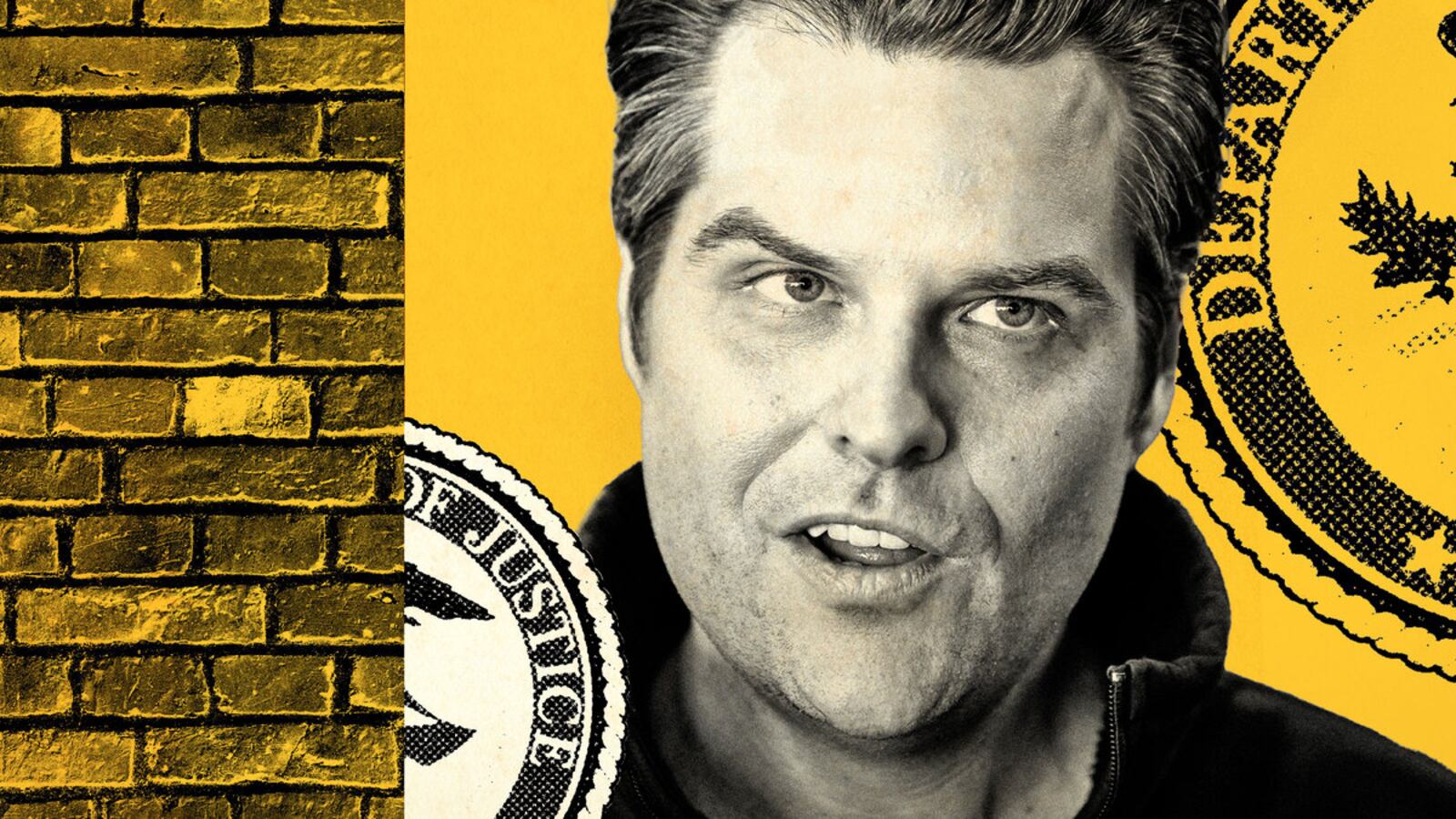As the House Ethics Committee probes allegations that Rep. Matt Gaetz (R-FL) paid for sex with an underage teen, congressional investigators are hitting a wall: the Department of Justice.
The DOJ is “stonewalling” the committee and refusing to turn over relevant information about its own sprawling criminal probe into Gaetz, frustrating the pace of the congressional investigation and leading the committee to seriously consider issuing subpoenas to the feds, according to two sources familiar with the matter.
Currently, the committee has authorized multiple subpoenas to the DOJ for the information but has not served them yet, according to one source. Another source added that it is unusual for the DOJ to push back against the committee to this extent, especially when the relevant investigation isn’t active.
The feds have in the past been willing to pass information to the committee so long as it doesn’t interfere with an active and ongoing investigation—which the Gaetz investigation is not.
Still, it’s not clear whether talks have broken down entirely—or what DOJ’s refusal could ultimately mean for the House probe—but the source indicated that the committee still holds hope that the feds will be more cooperative.
What happens next might be crucial for an investigation that could unearth damaging new information about the Florida congressman and potentially provide grounds for disciplinary action or even expulsion—just as Ethics’ probe of former Rep. George Santos did.
Notably, the Ethics Committee had previously cooperated with the DOJ’s investigation into Gaetz.
The Ethics panel had initiated its investigation into Gaetz shortly after the sex trafficking allegations first became public in 2021, when the House was under Democratic control. But the committee paused that effort when the feds asked them to back down, writing in a summary report that Ethics had “deferred consideration of the matter in response to a request from DOJ.”
The DOJ, of course, ultimately declined to prosecute Gaetz. In February 2023—after a 30-month investigation into allegations that Gaetz paid to have sex with a minor half his age—federal prosecutors informed the congressman’s attorneys that they were declining to charge him with any crimes.
But while Gaetz crowed over that news, the DOJ’s decision didn’t dissuade his colleagues. Months later, the Ethics probe was active once again—a development that put congressional investigators immediately at odds with the feds, raising the possibility that the two probes might reach different conclusions.
However, the Ethics investigation could not fully ramp up until the panel had completed its extensive and time-consuming probe into Santos. That matter concluded in November with a lengthy and damning final report that prompted Santos’ expulsion, after which the committee almost immediately fired up the Gaetz investigation.
They have worked at a fast pace. Within weeks, Ethics issued the first of what is now several rounds of subpoenas and interview requests with people in Gaetz’s circle, including key witnesses who could provide testimony, documents, and other evidence that would be critical to building a case against him.
House investigators, for instance, have issued a subpoena for Gaetz’s ex-girlfriend, a central witness for the DOJ, and have secured cooperation and evidence from Gaetz’s one-time wingman, Joel Greenberg. Most significantly, however, the panel has subpoenaed the formerly underage teen at the center of the allegations, who Gaetz allegedly paid for sex when she was a minor.
The congressional team also has the benefit of a roadmap that will allow it to cut straight to the most significant sources, thanks to years of public reporting about the DOJ’s probe.
Thanks to that trove, the extent that Ethics will need the DOJ’s cooperation is still unclear.
While certain evidence might ultimately be inaccessible—such as grand jury testimony—congressional investigators also have tools that would allow them to attempt to replicate much of that evidence. One major issue, however, is the timing. The DOJ’s case file would likely offer shortcuts to crucial witnesses or other pieces of information, while possibly providing insight into unproductive lines of inquiry—and thereby saving the committee a lot of time.
However, if the DOJ continues to refuse to cooperate at all, that could significantly hinder the committee’s investigation and potentially stall it—at least until the timeline runs into the heart of election season, with voting in the Florida's congressional primaries only about three months away.
DOJ, the House Ethics Committee, and a spokesperson for Gaetz all declined to comment for this story.
If the committee’s investigation does, in fact, find evidence Gaetz committed crimes or broke House rules, he could face a similar fate to that of Santos: expulsion. The Trump-allied congressman has publicly decried the Ethics investigation at every turn. After Gaetz moved to oust Kevin McCarthy as Speaker last year, The Daily Beast reported he told colleagues it was because of McCarthy’s failure to scuttle the probe.
Still, the committee has yet to vote to authorize an investigative subcommittee—a smaller group of members who are tasked with investigating and ultimately compiling a report—to look into Gaetz. Instead, the investigation still remains on the staff level.
While the DOJ did not charge Gaetz with any crimes, they did charge two people associated with Gaetz—Greenberg and another sidekick, Joe Ellicott. A third man, Stephen Alford, pleaded guilty in 2021 to attempting to defraud Gaetz and his family when he promised them President Joe Biden would pardon Gaetz for the alleged sex crimes if his family gave Alford $25 million to help free an American hostage held in Iran and long presumed dead.
Greenberg, a former longtime close friend of Gaetz’s, confessed and was convicted of multiple charges related to the alleged sex ring, including having sex with the 17-year-old girl at the center of the Gaetz investigation.









